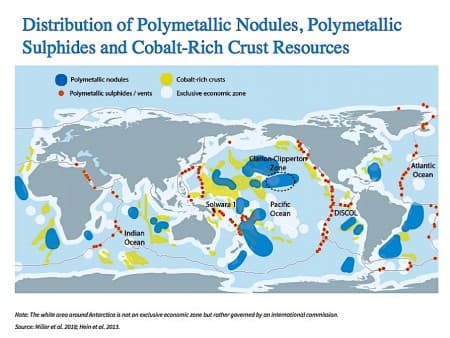Breaking News:

Venezuela Has a Natural Gas Problem
Venezuela's natural gas production has…

A Volatile Week for Oil Prices
A very volatile week for…
Google, Samsung, BMW And Volvo Support Ban On Deep-sea Mining
BMW, Volvo, Google and Korean battery maker Samsung SDI, have vowed not buy metals produced from deep-sea mining until the environmental risks of the activity are “comprehensively understood”.
The companies are the first global businesses to support a World Wildlife Fund (WWF) call for a moratorium on mining the seabed, which could deal a major blow to firms planning to mine the deep ocean this decade.
The signatories have also said they will not finance any deep sea mining companies.
“Before any potential deep seabed mining occurs, it needs to be clearly demonstrated that such activities can be managed in a way that ensures the effective protection of the marine environment,” they said in the statement.
“All alternatives to deep sea minerals must be explored as a matter of urgency, with a focus on reducing demand for primary metals, transitioning to a resource-efficient, closed-loop materials economy, and developing responsible terrestrial mining practices,” the four companies noted.
Mining the ocean floor has been promoted as an alternative to land-based mining, as demand for minerals needed for a green energy transition, such as cobalt and nickel, are set to exceed current production rates by 2030.
Yet regulations to support the emerging activity have yet to be agreed upon by the International Seabed Authority (ISA). The UN-backed body of 167 countries has already issued exploration contracts to 21 companies, but they cannot begin mining until regulation is passed.
An international team of researchers published in 2018 a set of criteria to help the ISA protect biodiversity from deep-sea mining activities while it prepares global rules.
Related: Will The World’s Newest Oil Benchmark Be A Success?
According to the US Geological Survey, the deep-sea accounts for more than half the world’s surface and contains minerals in concentrations several times higher than those found in all land reserves combined.
Targeting nodules
The main target of companies planning to mine underwater are polymetallic nodules. These small rocks, which lie in a shallow layer of mud on the seafloor, are rich in cobalt, nickel, copper, manganese and rare earths.
Scientists and explorers have also identified cobalt-rich crusts, located shallower than nodules and sulphates.
Recent reports, including one commissioned by the High Level Panel for a Sustainable Ocean Economy (Ocean Panel), have called for further research to fill gaps in knowledge before any seabed mining is allowed. They have also argued for the need to set protected zones across all ocean regions under the ISA’s jurisdiction.
The European Parliament has also called for a ban on seabed mining until the environmental impacts and risks of disturbing unique deep-sea ecosystems are understood.

Taken from “What Role for Ocean-Based Renewable Energy and Deep-Seabed Minerals in a Sustainable Future?”
In the resolution, passed three years ago, the legislators also urged the European Commission to persuade member states to stop sponsoring and subsidizing licenses to explore and exploit the seabed in international waters as well as within their own territories.
Conservationists recommend countries to encourage the recycling of battery metals to reduce the need of finding new supplies.
Supporters of the activity, however, argue that the extraction of battery metals from the ocean floor could potentially eliminate, or dramatically reduce, most of the environmental and social impacts associated with the extraction of riches from the Earth’s surface.
Companies actively seeking to mine the ocean floor include GSR, UK Seabed Resources and DeepGreen, which recently announced plans to go public in a merger with a special purpose acquisition company (SPAC).
By Mining.com
More Top Reads From Oilprice.com:
MINING.com
MINING.com is a web-based global mining publication focusing on news and commentary about mining and mineral exploration. The site is a one-stop-shop for mining industry…
Open57.81
Trading Vol.6.96M
Previous Vol.241.7B
















